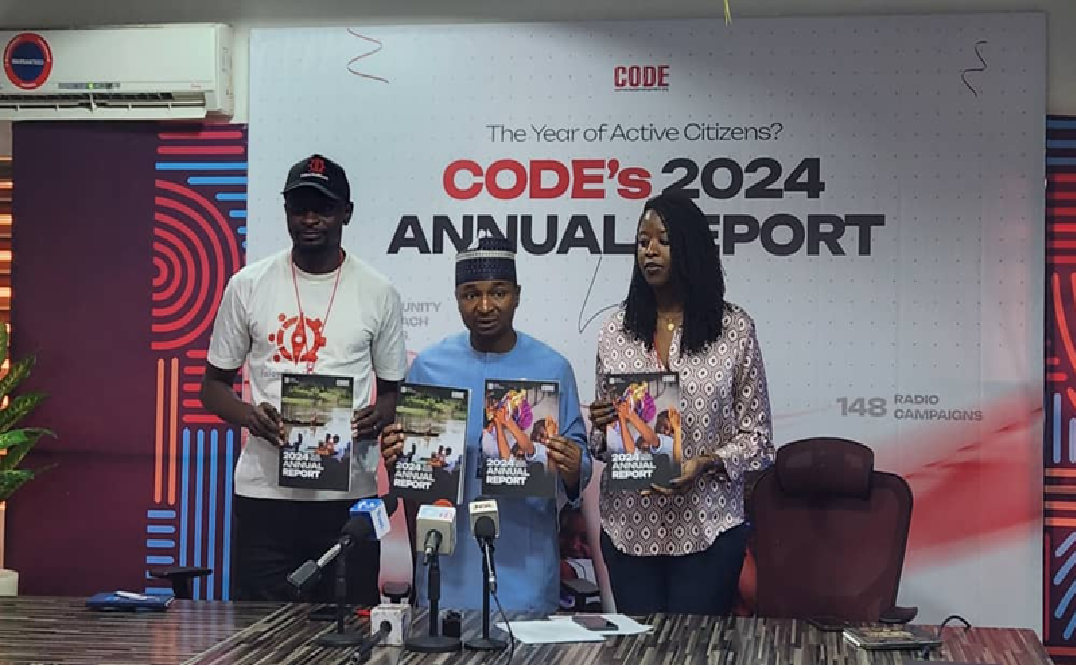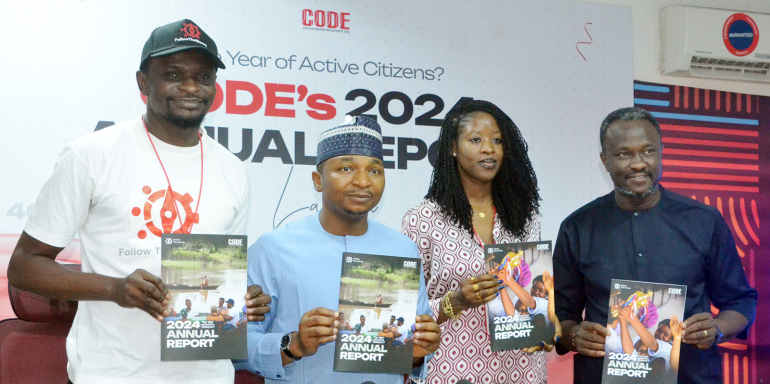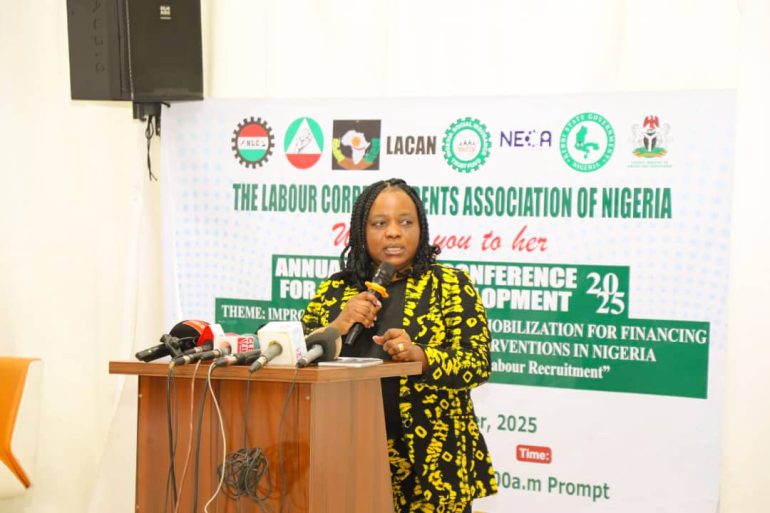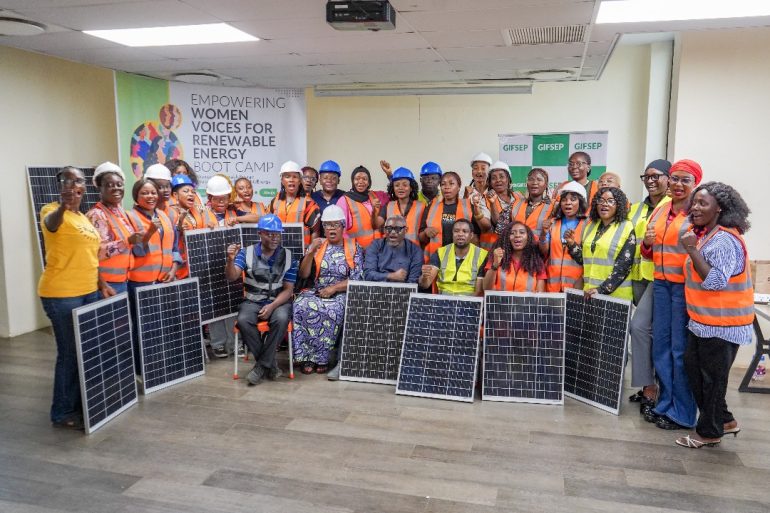Listeners:
Top listeners:
-
play_arrow
104.9FM Best rock music demo
-
play_arrow
Demo Radio Nr.1 For New Music And All The Hits!
-
play_arrow
Demo Radio Techno Top Music Radio
-
 play_arrow
play_arrow
Police Commissioner Launches Weapon and Riot Control Training for FCT Officers Democracy Radio

By Julian Osamoto
Connected Development (CODE), a leading civic organisation, has launched its 2024 Annual Report, spotlighting a year marked by grassroots advocacy, civic engagement, and democratic accountability across Africa.
Speaking at the event in Abuja, the organisation’s Chief Executive, Hamzat Lawal, described 2024 as “The Year of the Active Citizen,” citing widespread community mobilisation, education interventions, and climate advocacy as central themes.
“This report reflects our deepened commitment to empowering marginalised communities and advancing transparency across Africa,” Lawal said.
According to the report, CODE spearheaded over 40 campaigns in 12 African countries, engaging more than 3,000 citizens through 57 town hall meetings, 40 community outreach events, and 30 capacity-building workshops. These efforts focused on climate justice, education, and good governance.

A major milestone in 2024 was the expansion of CODE’s flagship Follow The Money (FTM) initiative into Sierra Leone, bringing the initiative’s footprint to 12 African nations. The group tracked over ₦4 billion in public expenditure across multiple projects, including 20 in Nigeria.
In Sierra Leone, CODE delivered training programmes and developed a 12-month advocacy roadmap aimed at ensuring long-term impact through community-led action.
Back home in Nigeria, the organisation’s campaign against gender-based violence saw a breakthrough with the passage of the Child Protection Bill in Kano State. The law, aimed at safeguarding children—particularly girls in rural communities—is being supported with follow-up efforts to ensure effective implementation.
Education and Climate: Twin Pillars of 2024 Agenda
Education was another critical focus. In collaboration with the Malala Fund, CODE launched the Girl-Child Education Project in Bauchi State, tackling barriers to girls’ enrolment, advocating for increased budgetary commitments, and initiating teacher recruitment drives. Mentorship programmes were also introduced to equip young girls with digital and life skills.
Additionally, in partnership with USAID, CODE extended early literacy support to Adamawa, Bauchi, and Sokoto states under the LEARN2READ initiative. This included addressing gender-based violence and cultural practices affecting girls’ education.
Through the AGILE (Adolescent Girls Initiative for Learning and Empowerment) project, CODE supported education access in 18 states, promoting conditional cash transfers and community sensitisation against harmful social norms.
However, findings from a nationwide education and health facility assessment—conducted between December 2022 and January 2023—exposed critical infrastructure and policy gaps. Covering 553 schools and 784 health centres across 34 states and 332 Local Government Areas, the analysis revealed that:
-
Overcrowding persists, particularly in northern regions, with average class sizes far exceeding the national benchmark of 40 pupils per class.
-
Gender disparities remain stark: while female enrolment outpaces male enrolment in some southern zones, the North East and North West record significantly higher male attendance.
-
More than 50% of teachers in Zamfara and Sokoto have received no professional training.
-
Teacher absenteeism across multiple states—such as Borno, Rivers, and Gombe—continues to hamper classroom learning.
-
Sanitation challenges are widespread, with over 30% of schools in Kebbi and Ekiti still using shared toilets for boys and girls.
-
Access to safe drinking water remains limited. Only 20% of schools in Benue, 18% in Cross River, 7% in Enugu, and fewer than one in five schools in Niger and Osun have reliable water sources. Some schools in Taraba, Imo, Sokoto, and Abia lack water entirely.
“These numbers tell a sobering story,” Mr Lawal said. “Despite nearly ₦894 billion spent on education by states, many children still lack the basics—functional classrooms, trained teachers, and access to clean water.”
He called on government, civil society, and development partners to urgently invest in teacher training, infrastructure upgrades, and better budget implementation, stating that “we owe it to Nigeria’s future to turn these investments into measurable change.”
Climate Action and Civic Space
In 2024, CODE also published a landmark report on climate finance in Nigeria, revealing structural gaps and a reliance on debt-based mechanisms. The organisation called for a shift towards sustainable, grant-based funding models to meet Nigeria’s climate commitments.
On civic freedoms, CODE trained over 1,200 youth to demand accountability from elected officials, while a separate study by the organisation raised alarm over the shrinking space for civil society, urging authorities to protect free expression and democratic participation.
Looking Ahead
As CODE celebrates what it terms a “year of active citizens,” Mr Lawal expressed gratitude to communities, partners, and supporters.
“Every number in this report tells a story of resilience and hope,” he said. “But this is just the beginning. At Connected Development, we remain committed to building a more just, inclusive, and empowered Africa.”
Written by: Julian Osamoto
#CODE #DemocracyRadio #Follow The Money #Hamzat Lawal
Similar posts
Copyright Democracy Radio -2024


